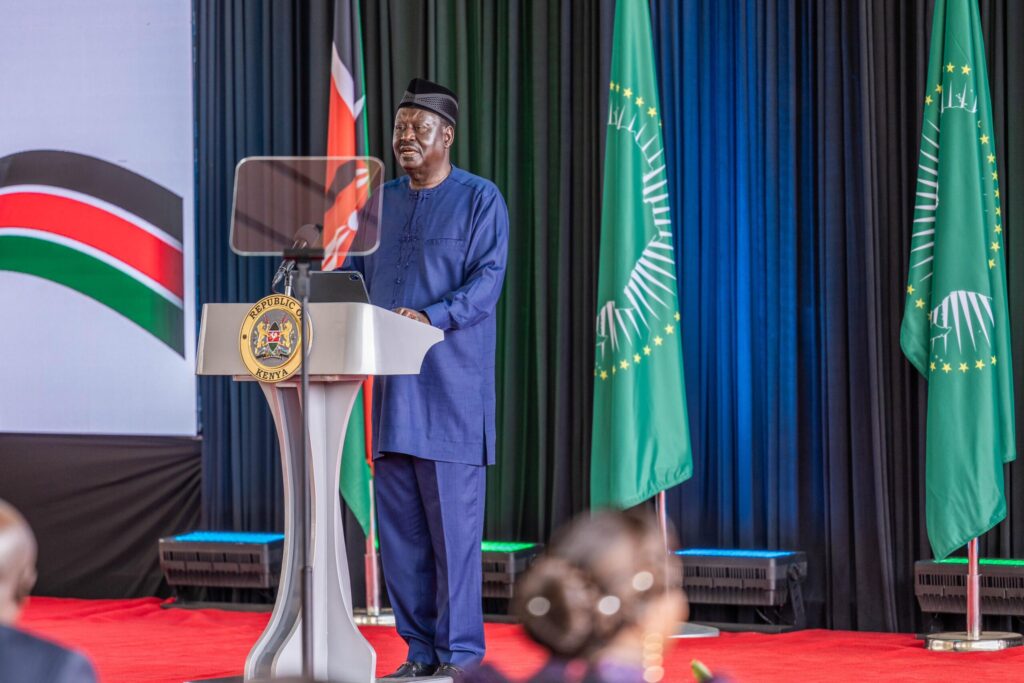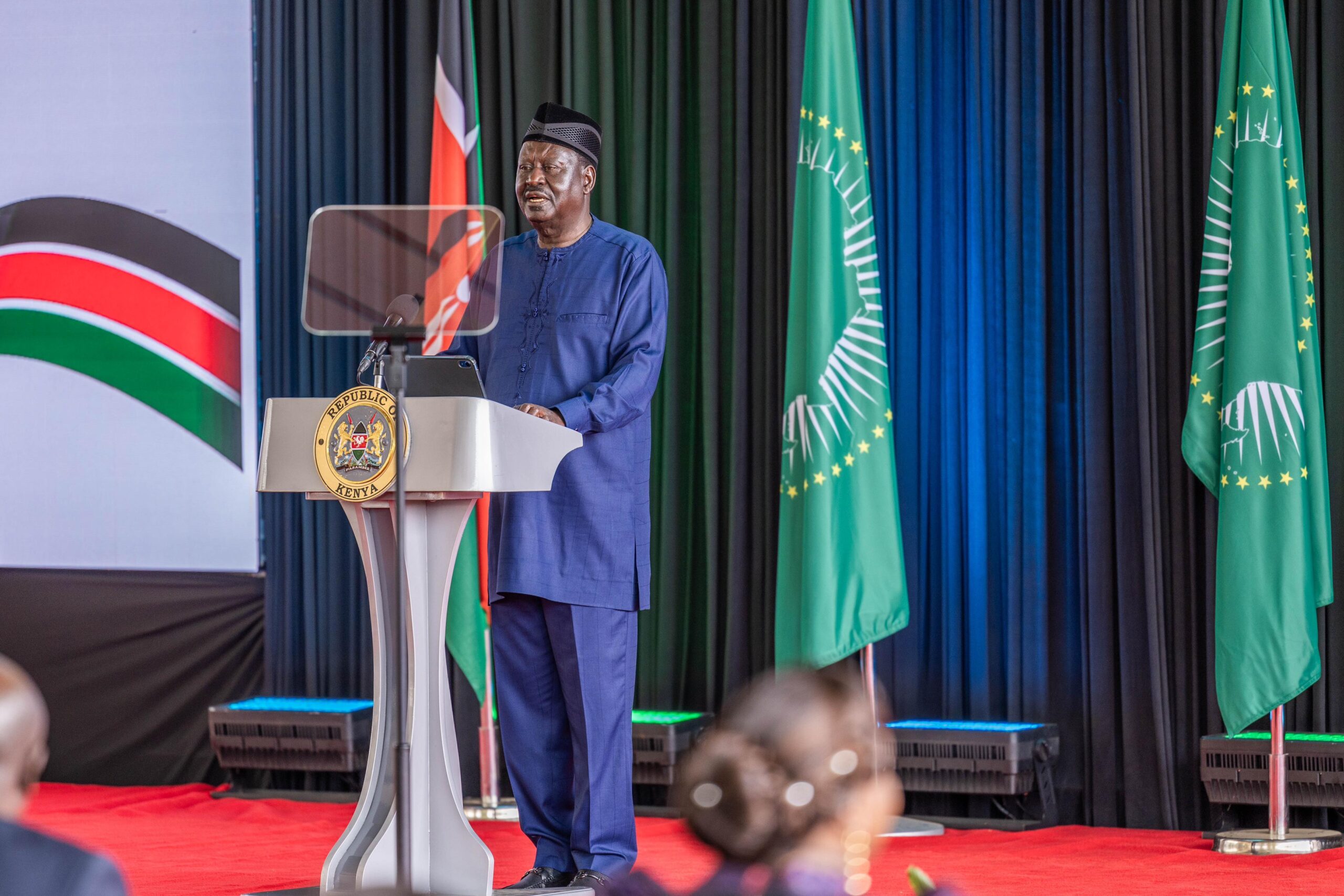
The ambitious campaign by Kenya’s seasoned opposition stalwart, Raila Odinga, to clinch the Chairperson position of the African Union Commission (AUC) in February 2025 turned into a high-stakes global race. Backed fervently by Kenya’s President William Ruto, Odinga’s campaign not only embodied Kenya’s aspirations for continental leadership but also hinted at a potential shift in African geopolitical dynamics. Securing victory meant a pivotal elevation of Kenya’s influence, enabling it to mold the policies of a swiftly evolving Africa. However, the dramatic turn of events saw Odinga facing a crushing defeat at the hands of Djibouti’s Foreign Minister, Mahmoud Ali Youssouf, during the seventh round of voting, where Youssouf garnered the mandated two-thirds majority. Odinga’s loss reverberated through Kenya’s political sphere, raising concerns about its diplomatic status and generating repercussions for Kenyan-Americans deeply engaged in African political developments.
The setback suffered by Odinga transcended personal ramifications to expose the underlying political and geopolitical fault lines within the African Union. The election procedure, shrouded in secret balloting among African heads of state, unveiled intricate shifts in alliances, regional contests, and the sway of external forces in AU leadership competitions. Initially leading the race with substantial backing from East African countries, Odinga found his support waning as a coalition of Francophone and Muslim-majority nations coalesced behind Youssouf, tipping the scales in the latter’s favor. Despite Kenya’s spirited lobbying efforts on the diplomatic front, its strategy faltered in consolidating a decisive support bloc. The failure was attributed to a mix of overconfidence in Kenya’s campaign, a misreading of regional politics, and foreign policy missteps alienating crucial African allies.
The implications of Odinga’s defeat resonate deeply in Kenya’s political landscape. For Odinga, it marks another high-profile electoral setback in a long line of defeats in his career. Nonetheless, history suggests that this setback is unlikely to signify his political swansong. Anticipations in Kenya hint at Odinga returning to domestic politics with renewed vigor, potentially heralding a sixth bid for the presidential seat in 2027. His supporters, who viewed the AU position as a pinnacle achievement in his illustrious career, are now prompted to readjust their expectations. Instead of assuming a diplomatic role at the continental level, Odinga is poised to re-establish himself as the foremost opposition figure, challenging Ruto’s administration and reshaping the country’s political discourse in the foreseeable future.
President William Ruto confronts pertinent questions following this defeat concerning Kenya’s diplomatic influence and broader foreign policy trajectory. Despite their historical rivalry, Ruto’s government threw its weight behind Odinga’s candidacy, a move that raised eyebrows. In an extensive pan-continental lobbying campaign, Kenya expended significant diplomatic capital to gather endorsements from other African Union member States. Odinga’s loss in the face of this concerted effort points to a miscalculation in Kenya’s ability to sway AU member states. Domestically at home, this situation places Ruto in a delicate spot as scrutiny intensifies over Kenya’s failure to muster adequate backing. To some analysts, this is a manifestation of Kenya’s mounting regional isolation, with neighboring states expected to support Odinga exhibiting indecision. On the other hand, others view the defeat as a catalyst for Ruto’s administration to reevaluate its African diplomacy approach amidst stiffening competition from Francophone nations and emerging regional powerhouses.
The aftermath of the election reshapes the power dynamics within the African Union. Djibouti’s victory bolsters its regional influence, positioning it as a key player in Horn of Africa politics. Concurrently, the success of the Francophone-Muslim coalition underscores its capability to influence AU leadership outcomes, potentially marginalizing Anglophone states like Kenya. South Africa’s lukewarm support for Odinga signals a shift in continental leadership dynamics, indicating that economic powerhouses like Kenya cannot rest on their achievements. The election also underscores Africa’s intricate and imbalanced power relationship with global superpowers. While foreign nations do not directly cast votes in AU elections, influential players such as France, the United States, China, and Russia wield substantial sway over African diplomacy. Kenya’s perceived alignment with Western interests, notably its stance on the Israel-Palestine conflict and its condemnation of Russia’s Ukraine incursion, likely incurred Odinga crucial votes from states favoring non-alignment. Conversely, Djibouti, hosting both U.S. and Chinese military installations, adeptly navigated global tensions, presenting itself as a palatable candidate to diverse AU factions.
The repercussions of Odinga’s failed bid extend beyond Africa, reaching into the Kenyan-American diaspora, an actively engaged community in U.S. and Kenyan affairs. Odinga’s candidacy represented a chance for Kenya to attain enhanced global standing in the eyes of many Kenyan-Americans. His triumph would have elevated Kenya’s diplomatic prestige, potentially facilitating deeper engagement by Kenyan-American organizations, business leaders, and activists with African institutions. The defeat, however, raises doubts concerning Kenya’s ability to compete for leadership positions on a global scale. To some diaspora members, this could be perceived as a clarion call for increased advocacy and support for Kenyan representatives in international arenas. The loss underscores the imperative for Kenyan-American professionals in think tanks, international bodies, and advocacy groups to assert a more proactive role in advancing Kenya’s interests in global governance.
Economic considerations also surface in this scenario. Kenyan-Americans contribute over $4 billion annually to Kenya through remittances, constituting a crucial economic lifeline for the nation. A strong and influential Kenya at the AU level could have paved the way for intensified economic stability, fostering increased diaspora investment in domestic projects. However, some investors may now hesitate, questioning Kenya’s diplomatic efficacy in nurturing beneficial trade agreements and regional economic partnerships. Additionally, Kenyan-Americans eyeing business expansions into Africa may find themselves reevaluating Kenya’s standing within the African Continental Free Trade Area (AfCFTA) and other pan-African economic ventures.
Politically, Odinga’s setback has the potential to galvanize diverse factions within the Kenyan-American community. His U.S.-based supporters, long immersed in diaspora activism, may perceive this as an impetus to advocate for his resurgence in domestic politics, endorsing his leadership bid in the forthcoming 2027 elections. Conversely, Kenyan-Americans aligned with Ruto’s faction could interpret the defeat as an indication of a new era of leadership untethered to the country’s entrenched political dynasties. This ideological split may shape diaspora involvement in both U.S. and Kenyan political arenas, shaping conversations on governance, democracy, and foreign policy.
Looking ahead, Kenya must recalibrate its diplomatic blueprint. The government faces the imperative to rebuild alliances, enhance regional clout, and fine-tune its foreign policy to harmonize effectively with continental imperatives. Simultaneously, the Kenyan-American diaspora possesses an opportunity to exert a pronounced influence in shaping Kenya’s international interactions. Whether through investments, advocacy efforts, or policy inputs, the diaspora can propel Kenya to sustain its competitive edge in African and global affairs. Odinga’s defeat, albeit a setback, underscores the essence of long-term vision, coalition-building, and strategic foresight in diplomacy and leadership.
As Kenya reflects on this electoral rebuff, the diaspora must gaze forward. Whether through investments, political engagements, or global advocacy, Kenyan-Americans have a pivotal role in defining the nation’s forthcoming triumphs. The setback in Addis Ababa does not denote a conclusion but serves as a clarion call for Kenya to redefine its stature within Africa and beyond.

